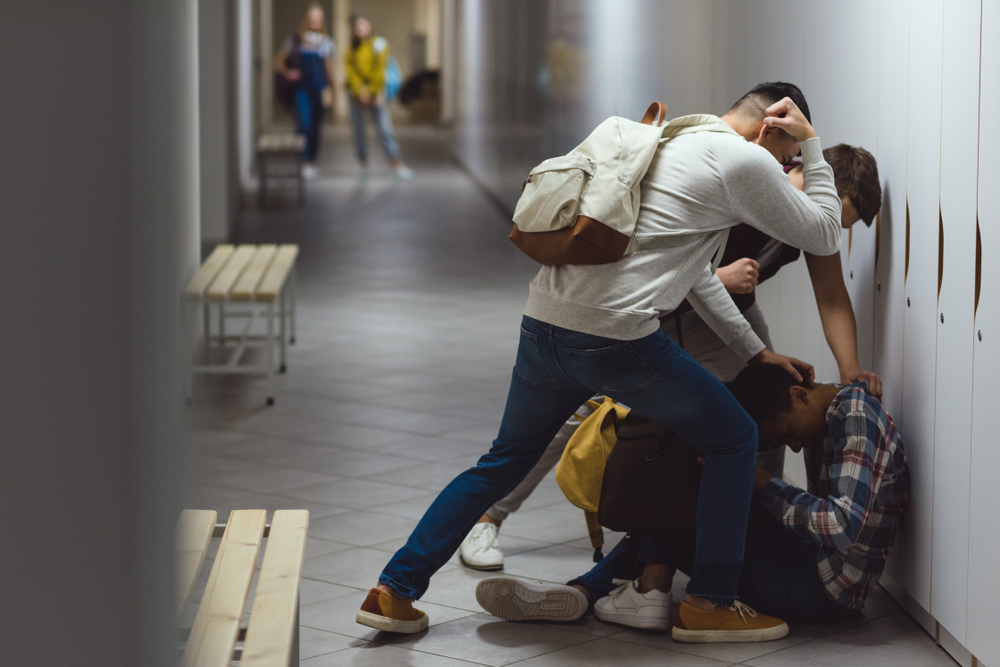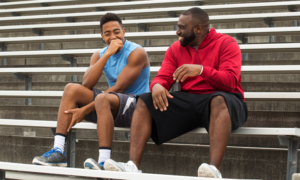Some of the nation’s school districts ticket and fine students, usually for minor infractions. A November 14 correction to this article removed an assertion that students also are ticketed for potential felonies.
When her autistic son appeared at a Bloom Township, Illinois municipal court hearing for fighting at high school in the fall of 2021, Elizabeth Posley noticed that he was having trouble understanding the court official’s questions about the incident.
“So, it’s kind of, like,” said Posley, explaining the officer’s response to Jeremiah, “‘Okay, whatever. You knew better. Seventy-five dollars.’”
She detailed that $75 levy against her son and questioned whether the hearing officer knew anything about people with disabilities during a recent webinar about a Chicago Tribune and ProPublica joint investigation of police ticketing of misbehaving students in Illinois, a practice that either exists in or has banished from various school districts across the country.
Under local ordinances, school resource officers or local police departments can ticket students for what usually are non-felony infractions such as fighting or disrupting classroom instruction.
There is no centralized database of how many school districts employ that kind of discipline. Harold Jordan, the American Civil Liberties Union’s nationwide education equity coordinator, told Youth Today that he pushed for ticketing to be included in the U.S. Department of Education’s definition of referrals to law enforcement during the Obama Administration. The federal government collects data on school ticketing but doesn’t isolate those numbers so that they are readily accessible, Jordan said.
Much of the attention on the topic has been generated by a handful of local news outlets. The Texas Tribune tracked the rise in ticketing in that state in 2010, where students as young as 10 were being cited. The Center for Public Integrity published a 2011 report on the ticketing of students 14 and younger in Los Angeles; the city’s Unified School Police Department stopped ticketing students 12 and younger two years later. In 2019, the Lancaster News in Pennsylvania reported on the long-term effects of citations on young people. Chalkbeat Colorado reported in 2020 on ticketing’s disparate impact on Black students in Denver.
“School administrators tell themselves that enlisting law enforcement and using this process can scare the kid straight and … set the tone of, ‘We mean it. Get it together. Start behaving.’ But what it does, instead, is it pushes the student further and further away,” said webinar panelist Jackie Ross, a Loyola University School of Law education law professor and staff attorney at Loyola’s Civitas ChildLaw Clinic.
Mo Canady, executive director of the National Association of School Resource Officers, a workforce largely made up of former police officers, said his organization doesn’t have a policy regarding ticketing. As the main training agency for such officers, it sets standards for how police operate in schools. Ticketing is not an issue he’s heard the organization’s members often discuss, Canady said.
Concern over assaults on teachers rises; non-fatal, in-school student crime falls
As ticketing is being spotlighted, some student behaviors that effect the climate for learning also are being noted. Edweek Research Center reported in August that more than 40% of educators said that at least one teacher in their district had been physically assaulted or attacked by a student in the past year and 10% said a student had assaulted them personally.
Additionally, the National Center for Education Statistics reported that theft, violence and other non-fatal victimization of students decreased from 2009 to 2019, from 51 per 1,000 youth to 30 per 1,000 youth. During the 2019–20 school year, 77% of public schools recorded at least one crime committed by students, amounting to 29 incidents per 1,000 students. Forty-seven percent of schools reported at least one crime committed by students to sworn law enforcement.
The center also reported that one-fifth of students said they were bullied at school in 2019.
Critics: Ticketing disrupts learning
Critics of ticketing argue that the practice fails to ensure that authority figures help kids recover from their mistakes, rather than simply get punished for them. They also say it makes some students feel unwelcome at school.
Sangeeta Prasad, executive director of the Center for Children’s Law and Policy, told Youth Today, via email, that a child’s failure to appear at a hearing could prompt a warrant for his or her arrest. If ticketed youth admit to being guilty of a violation, their parents or guardians can face as much as several hundred dollars in fines. Denying being guilty of an infraction can result in repeated appearances in court, interrupting students’ learning and potentially causing parents to miss work, she said, calling ticketing a “shocking failure.”
“We pay taxes for our schools to provide safe learning environments, not to operate ticketing schemes with local police,” Prasad said.
The National School Boards Association has no formal policy about ticketing, believing it to be a locally determined issue, said Jason Amos, the organization’s communications director. The National Association of School Superintendents didn’t respond to Youth Today’s request for comment.
Though no one that he knows of is tracking ticketing nationally, the ACLU’s Jordan said that what is known is that Black and brown students and students with disabilities are disproportionately numbered among those who get ticketed. Jordan said ticketing has increased over the last 25 years or so as more schools placed police officers inside school buildings.
He co-authored a 2022 ACLU report finding that police arrested students and educators referred students to police more often than they documented those actions.
Jordan’s research also found, as examples, that in Pittsburgh’s public schools, the second-largest district in the state, one in 70 Black students and one in 400 white students were cited. In Erie, where citations were issued to elementary school kids, Black students received citations at four times the rate of white students.
Infractions can end up on school disciplinary records, affecting students long after an incident may have been resolved.
“It is a lazy response to discipline,” Ross, of Loyola Law School, said. “It is a hasty response to discipline that school makers can take advantage of. It is a phone call. And, so, all of these protections that are put into place — to protect kids with disabilities, to protect Black and brown students — those are all stripped away when it is such a behind-the-scenes process. And that is the issue.”
School resource officer: Tickets may avert arrests
Canady, of the National Association of School Resource Officers, said he never saw a student ticketed during his 12 years as a school resource officer in Hoover, Alabama, a job he retired from in 2011.
He has read about students being ticketed in other parts of the country, including for such infractions as gum chewing. “And I don’t know how you get there in any way as a law enforcement officer,” he said, challenging tickets for minor infractions.
Nevertheless, he added, citations might be issued to avoid police responses to certain misdemeanors. If a young person is accused of stealing, for instance, a ticket can land them in a court hearing, with a parent, instead of under police arrest.
“The last thing that a good SRO,” said Canady, referring to resource officers, “should do is have a student walk out of school in handcuffs.”
Those officers should be carefully screened for their suitability for that job and trained in de-escalation, including talking students through a problem, instead of taking more severe action, he said.
His organization’s philosophy is that school administrators, not resource officers, should handle and resolve school disciplinary issues. Its mission is to bridge the gap between young people and law enforcement, Canady said.
“It’s kind of hard to bridge that gap if you’re walking around looking for an opportunity to write a student a ticket for some kind of misbehavior that really should be handled by the school in the first place,” he said.
***
Micah Danney’s byline also has appeared in the New York Daily News, WNYC, Sojourners, Newsweek, Mental Floss, the GroundTruth Project, The Times of Israel, Religion Unplugged and other publications.
































